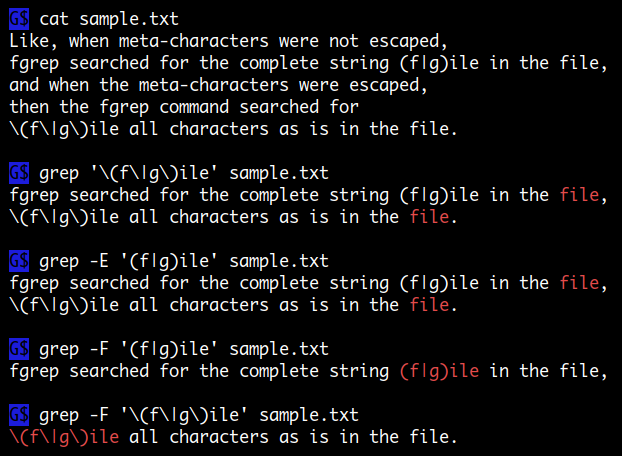
If it's the latter, then it may be because.

Instead of tediously opening every file, you can use grep for an entire directory, to find specific notes.It's not clear from your description whether your expression is failing to match things you want, or matching things you don't want. Finding Those Notes You Took Months AgoĪs I mentioned earlier, perhaps you may take notes but scatter them across your “documents” folder. The “” will look for events between 9:00 and 9:59. This recipe lets you do that: grep 'T09:' server.log
#GREP WILDCARD SOFTWARE#
It can be very useful to troubleshoot a software problem by seeing the logs for a certain day. Not Quite Enough? Here Are a Couple RecipesĮven after all our examples you may still find it difficult to see where grep and regex can help boost your productivity. This isn’t intended to be comprehensive, but rather to help you come away with an idea of all you might do. Hopefully, these examples give you an idea of just how versatile these types of searches are. grep “home|mobile” contacts.txt searches for any line that has either the word “home” or the word “mobile”.The wildcard lets you enter a search like, say, “d*g” in the dictionary and receive results that include “dog,” “dig,” and “dug.” d*g => ” contacts.txt searches contacts.txt for phone numbers. Think of a much simpler version of this concept: the wildcard.

Regular expressions are sequences of characters that represent patterns, and they instruct regex parsers on ways to search text and match patterns. Others hate them for their incomprehensibility and the confusion they create. People love regex for the power they confer on their users. You’ll find that programmers have a love-hate relationship with regex - as in, some programmers love them and others hate them. I don’t think regex has quite made the English dictionary yet, but programmers know what you mean by this. The term is actually, as I mentioned earlier, “regular expressions,” but it’s such a ubiquitous term in the programmer world that it’s earned a nickname. Speaking of power, let’s talk about regex. Its beauty lies in its simplicity and the power it gives you to do things. For instance, you can tell grep to ignore the case of the characters or to put the results into a new file.Īnd that’s really all there is to grep. The -options tag is just that: it lets you supply some options. So basically, at a command line prompt, you would type “grep ford cars.txt” if you wanted to search for the text “ford” in the file “cars.txt.” The grep utility would print any matching lines right there in the console for you to review. Here’s a template of what that looks like. Grep helps you search through files, looking for patterns.
#GREP WILDCARD WINDOWS#
It’s since made its way onto Linux machines and even into the Windows world. Grep (actually, “grep” - you don’t capitalize it) is a command line utility originating in the Unix world. When you’re done reading, you’ll understand the basics enough to search your files with grep-regex. To do that, I’ll walk through a hypothetical example of trying to extract some information.
#GREP WILDCARD HOW TO#
So let’s look at how to take the edge off of that and get you familiar with this file search technique. Again, grep and regex can rescue you here.īut with that versatility comes a bit of a learning curve. Or perhaps you are an avid note-taker, but you are too busy jotting them down to worry about organization. Imagine: you fret about organizing your files, because you can never seem to find where you put the last file. You can also search with extremely limited access to your environment, and if you get creative, you can find just about anything. Using this combination of tools, you can search files of any sort and size. Learning Grep and Regex Teaches You a Powerful Search Technique



 0 kommentar(er)
0 kommentar(er)
